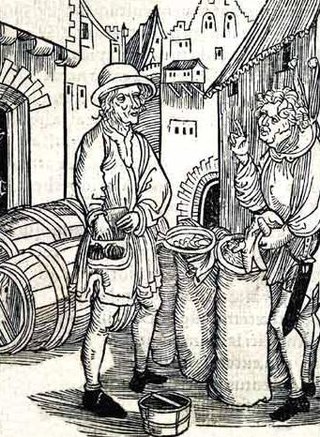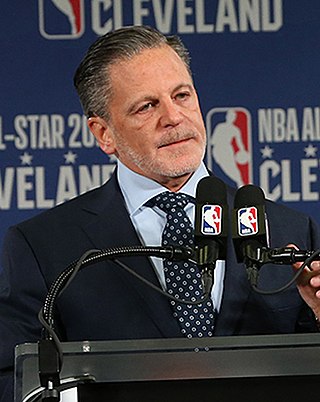
Debt is an obligation that requires one party, the debtor, to pay money borrowed or otherwise withheld from another party, the creditor. Debt may be owed by sovereign state or country, local government, company, or an individual. Commercial debt is generally subject to contractual terms regarding the amount and timing of repayments of principal and interest. Loans, bonds, notes, and mortgages are all types of debt. In financial accounting, debt is a type of financial transaction, as distinct from equity.

Usury is the practice of making loans that are seen as unfairly enriching the lender. The term may be used in a moral sense—condemning taking advantage of others' misfortunes—or in a legal sense, where an interest rate is charged in excess of the maximum rate that is allowed by law. A loan may be considered usurious because of excessive or abusive interest rates or other factors defined by the laws of a state. Someone who practices usury can be called a usurer, but in modern colloquial English may be called a loan shark. In many historical societies including ancient Christian, Jewish, and Islamic societies, usury meant the charging of interest of any kind, and was considered wrong, or was made illegal. During the Sutra period in India there were laws prohibiting the highest castes from practicing usury. Similar condemnations are found in religious texts from Buddhism, Judaism, Christianity, and Islam. At times, many states from ancient Greece to ancient Rome have outlawed loans with any interest. Though the Roman Empire eventually allowed loans with carefully restricted interest rates, the Catholic Church in medieval Europe, as well as the Reformed Churches, regarded the charging of interest at any rate as sinful. Religious prohibitions on usury are predicated upon the belief that charging interest on a loan is a sin.
A reverse mortgage is a mortgage loan, usually secured by a residential property, that enables the borrower to access the unencumbered value of the property. The loans are typically promoted to older homeowners and typically do not require monthly mortgage payments. Borrowers are still responsible for property taxes or homeowner's insurance. Reverse mortgages allow older people to immediately access the home equity they have built up in their homes, and defer payment of the loan until they die, sell, or move out of the home. Because there are no required mortgage payments on a reverse mortgage, the interest is added to the loan balance each month. The rising loan balance can eventually grow to exceed the value of the home, particularly in times of declining home values or if the borrower continues to live in the home for many years. However, the borrower is generally not required to repay any additional loan balance in excess of the value of the home.
A bridge loan is a type of short-term loan, typically taken out for a period of 2 weeks to 3 years pending the arrangement of larger or longer-term financing. It is usually called a bridging loan in the United Kingdom, also known as a "caveat loan," and also known in some applications as a swing loan. In South African usage, the term bridging finance is more common, but is used in a more restricted sense than is common elsewhere.
A bill of sale is a document that transfers ownership of goods from one person to another. It is used in situations where the former owner transfers possession of the goods to a new owner. Bills of sale may be used in a wide variety of transactions: to sell goods, exchange, give, or mortgage objects. They can be used only to transfer ownership of goods that people already own or to transfer ownership of moveable tangible goods and only by individuals and unincorporated businesses.

Credit is the trust which allows one party to provide money or resources to another party wherein the second party does not reimburse the first party immediately, but promises either to repay or return those resources at a later date. The resources provided by the first party can be either property, fulfillment of promises, or performances. In other words, credit is a method of making reciprocity formal, legally enforceable, and extensible to a large group of unrelated people.
A hard money loan is a specific type of asset-based loan: a financing instrument through which a borrower receives funds secured by real property. Hard money loans are typically issued by private investors or companies. Interest rates are typically higher than conventional commercial or residential property loans because of the higher risk and shorter duration of the loan.

A mount of piety is an institutional pawnbroker run as a charity in Europe from Renaissance times until today. Similar institutions were established in the colonies of Catholic countries; the Mexican Nacional Monte de Piedad is still in operation.
This article gives descriptions of mortgage terminology in the United Kingdom.
A secured loan is a loan in which the borrower pledges some asset as collateral for the loan, which then becomes a secured debt owed to the creditor who gives the loan. The debt is thus secured against the collateral, and if the borrower defaults, the creditor takes possession of the asset used as collateral and may sell it to regain some or all of the amount originally loaned to the borrower. An example is the foreclosure of a home. From the creditor's perspective, that is a category of debt in which a lender has been granted a portion of the bundle of rights to specified property. If the sale of the collateral does not raise enough money to pay off the debt, the creditor can often obtain a deficiency judgment against the borrower for the remaining amount.

Daniel Gilbert is an American billionaire, businessman, and philanthropist. He is the co-founder and majority owner of Rocket Mortgage, founder of Rock Ventures, and owner of the National Basketball Association's Cleveland Cavaliers. Gilbert owns several sports franchises, including the American Hockey League's Cleveland Monsters, and the NBA G League's Cleveland Charge. He operates the Rocket Mortgage FieldHouse in Cleveland, Ohio, home to the Cavaliers and Monsters. As of January 2023, Forbes estimated his net worth at US$18.3 billion.
The term flexible mortgage refers to a residential mortgage loan that offers flexibility in the requirements to make monthly repayments. The flexible mortgage first appeared in Australia in the early 1990s, however it did not gain popularity until the late 1990s. This technique gained popularity in the US and UK recently due to the United States housing bubble.
The subject of loans and interest in Judaism has a long and complex history. In the Hebrew Bible, the Book of Ezekiel classifies the charging of interest among the worst sins, denouncing it as an abomination and metaphorically portraying usurers as people who have shed the borrower's blood. The Talmud dwells on Ezekiel's condemnation of charging interest.

A mortgage loan or simply mortgage, in civil law jurisdictions known also as a hypothec loan, is a loan used either by purchasers of real property to raise funds to buy real estate, or by existing property owners to raise funds for any purpose while putting a lien on the property being mortgaged. The loan is "secured" on the borrower's property through a process known as mortgage origination. This means that a legal mechanism is put into place which allows the lender to take possession and sell the secured property to pay off the loan in the event the borrower defaults on the loan or otherwise fails to abide by its terms. The word mortgage is derived from a Law French term used in Britain in the Middle Ages meaning "death pledge" and refers to the pledge ending (dying) when either the obligation is fulfilled or the property is taken through foreclosure. A mortgage can also be described as "a borrower giving consideration in the form of a collateral for a benefit (loan)".
In real estate, creative financing is non-traditional or uncommon means of buying land or property. The goal of creative financing is generally to purchase, or finance a property, with the buyer/investor using as little of his own money as possible, otherwise known as leveraging. Using these techniques an investor may be able to purchase multiple properties using little, or none, of his "own money".
In finance, subprime lending is the provision of loans to people in the United States who may have difficulty maintaining the repayment schedule. Historically, subprime borrowers were defined as having FICO scores below 600, although this threshold has varied over time.
Gemach is a Jewish free-loan fund that subscribes to both the positive Torah commandment of lending money and the Torah prohibition against charging interest on a personal loan to a fellow Jew. Unlike bank loans, gemach loans are interest-free, and are often set up with easy repayment terms.
The International Association of Hebrew Free Loans (IAHFL) is an umbrella organization for Hebrew Free Loan societies, organizations that offer interest-free loans to Jews. There are members around the world, with most in North America. Each member organization has its own rules regarding such things as who may borrow, the maximum loan amount, and the repayment process. However, all offer loans without interest.
The Hebrew Free Loan Society of Greater Philadelphia (HFLGP) provides interest-free loans to members of the Philadelphia Jewish community in need. Founded in 1984 as the Hebrew Free Loan Society at Beth Sholom and housed at Beth Sholom Congregation, by 2006, over $2 million in loans had been granted from its revolving fund. HFLGP is a member of the International Association of Hebrew Free Loans.
Zidisha is a peer-to-peer microlending service that allows people to lend small amounts of money directly to entrepreneurs in developing countries. It is the first peer-to-peer microlending service to link borrowers and lenders across international borders without a local microfinance institution intermediary. The organization is named after the Swahili word zidisha, which means "grow" or "expand".






